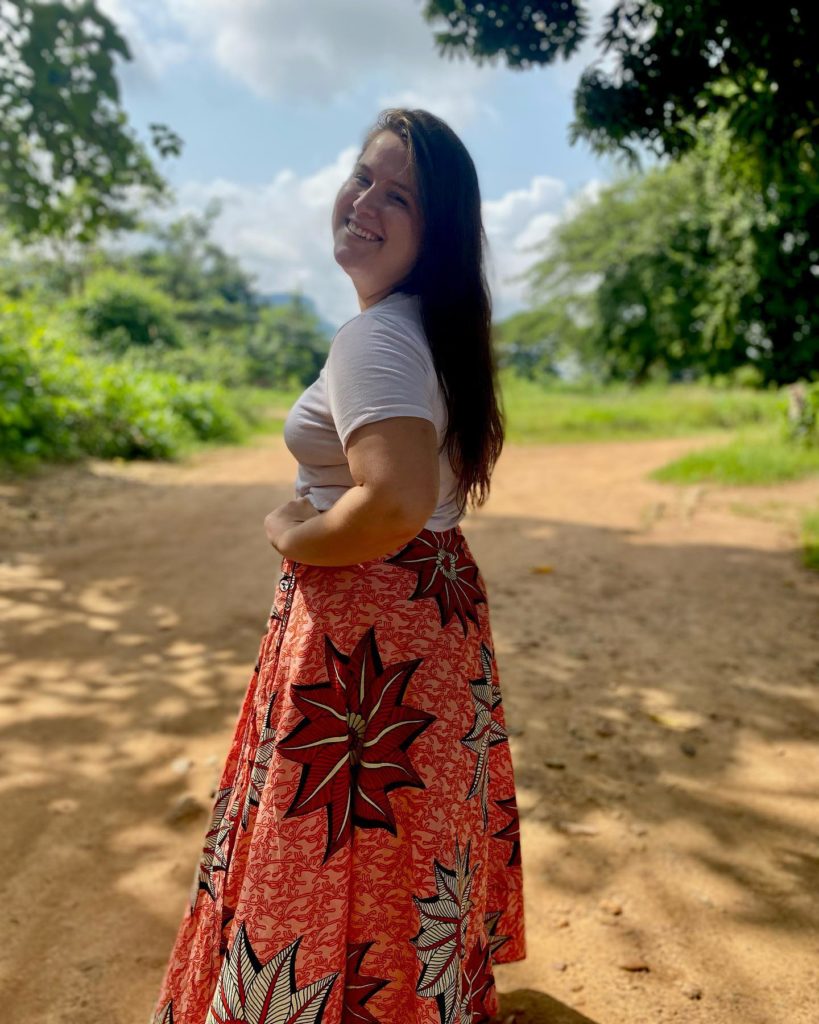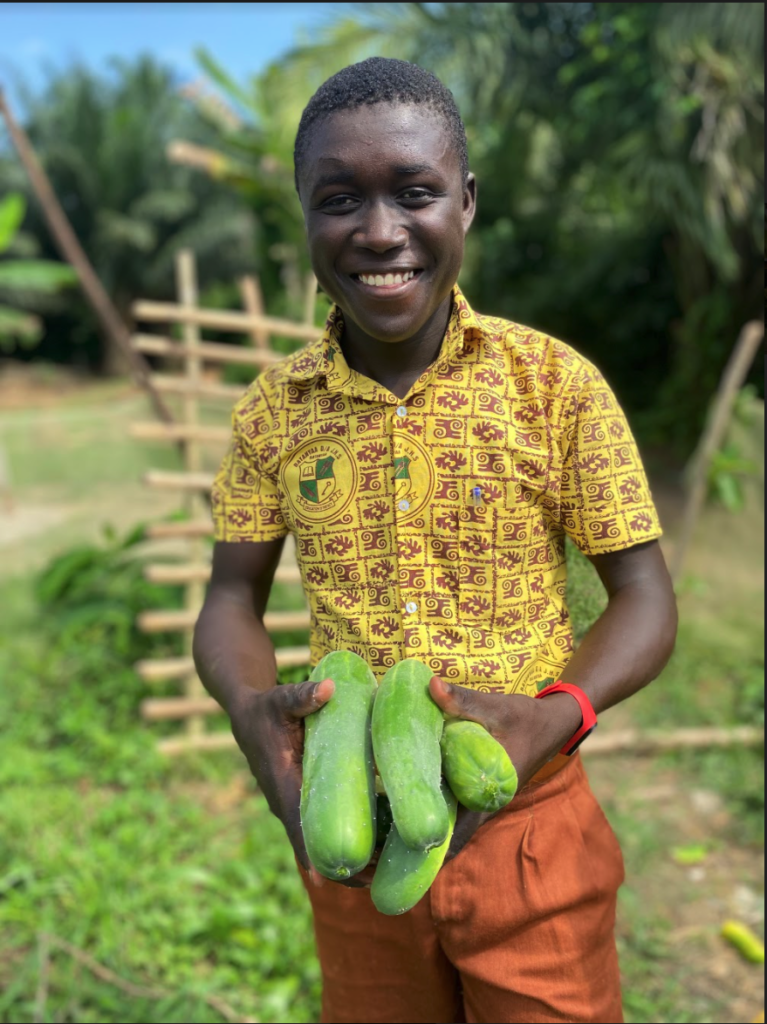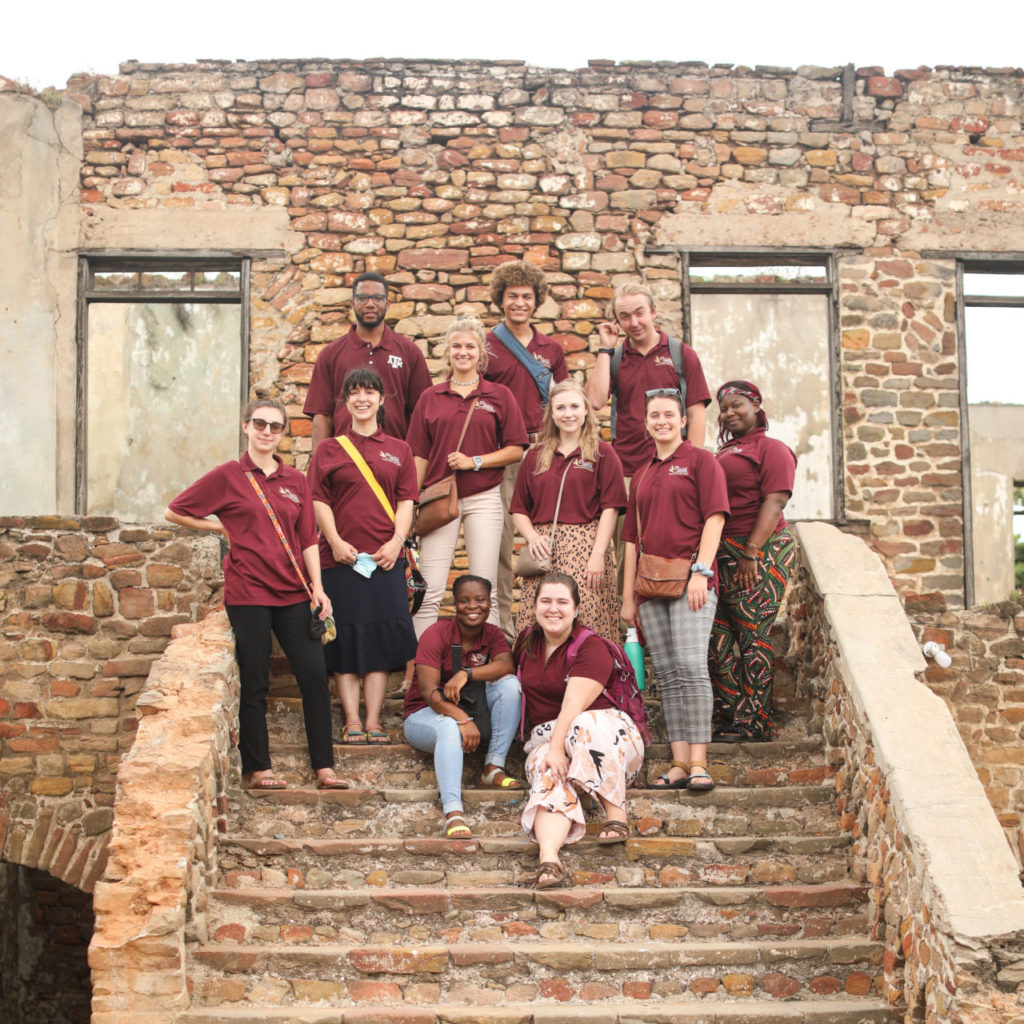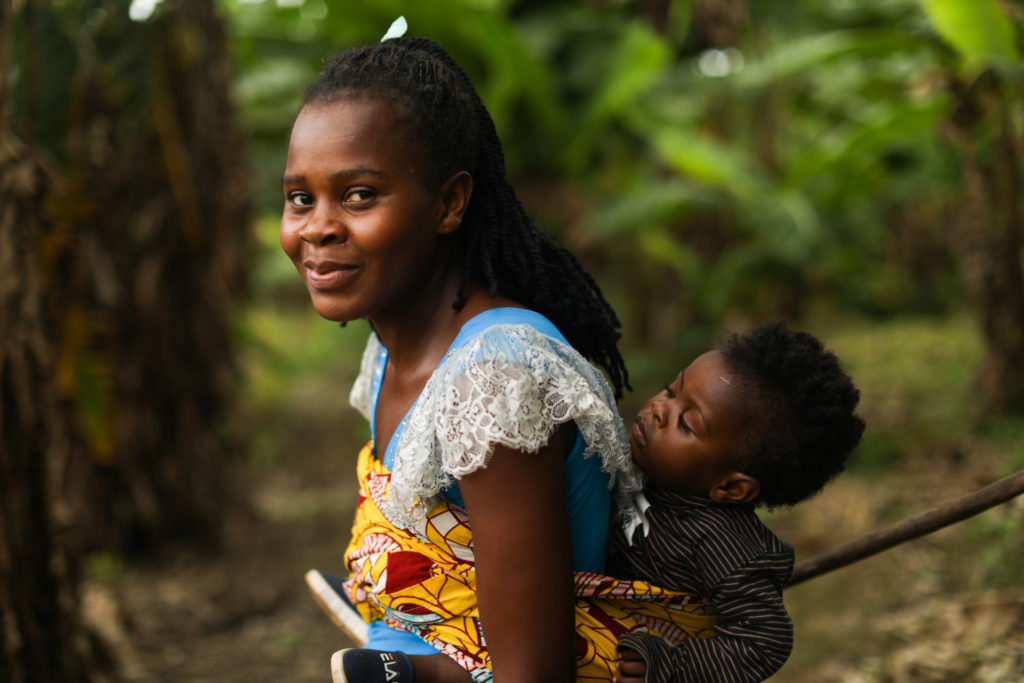Aggie promotes food security, well-being through agricultural education
Former Texas A&M student helps build capacity, advance agriculture in Ghana
For the past two months, Jessica Spence ’18 has lived a daily experience few Aggies can claim. She has been roused every morning to the crow of roosters and the sounds of palm brooms sweeping outside her little blue house in Koforidua, Ghana.

Spence is a two-time graduate from the College of Agriculture and Life Sciences Department of Agricultural Leadership, Education and Communications. She now serves as the program coordinator in Ghana for the International Agricultural Education Fellows Program, IAEFP. IAEFP is a partnership between AgriCorps and the Texas A&M Borlaug Institute for International Agriculture, funded by the U.S. Department of Agriculture’s Foreign Agricultural Service, USDA FAS.
The Borlaug Institute, a unit of Texas A&M AgriLife, focuses on designing and implementing science-based agricultural development and training programs to benefit small-holder farmers in the developing world. And the IAEFP program plays a key role in sharing agricultural knowledge and resources across the globe to increase agricultural literacy and develop healthy, sustainable communities.
Using her training in agricultural communication and international agricultural development received as a student in the College, Spence leads the nine 2021-22 IAEFP agricultural education fellows and oversees the IAEFP program, in coordination with 4-H Ghana, their in-country partner.
As the coordinator, she evaluates the program and provides training and support to fellows and Ghanaian teachers who use agricultural education to build capacity in their community. This knowledge is shared with local farmers to help them produce crops and raise livestock more sustainably, which in turn helps meet the food insecurity needs locally and across the country.
Building capacity for agricultural advancement in Ghana
“Countries like Ghana have incredible resources; tons of rain, fertile land and opportunities for extremely productive agriculture,” Spence said. “Currently, agriculture is not produced to the capacity that it could be and food insecurity is an issue within the country. That has the potential to be solved with agricultural education, enhancements and development.”

Spence said that with agriculture being such a vital part of the Ghanaian lifestyle, bringing school-based agricultural education into the country is a way to help them become more efficient and sustainable producers, but also a way to get students excited about agriculture.
The IAEFP fellows partner with science teachers in Ghana to establish or continue 4-H clubs and often help with demonstration gardens. Spence said the harvest from the gardens is used for school meals or is sold at local produce markets to invest back into the 4-H club for supplies or training.
One of the fellows recently harvested cucumbers with their students. The fellow told Spence how the students’ eyes lit up seeing the fruits of their labor.
“I think that’s the most impactful thing about this job,” Spence said. “Our students are excited and really receptive to learning. That’s going to translate to that student being receptive to technical and experiential knowledge and leaving their experience in 4-H a more well-rounded and knowledgeable young person who will turn into a leader and advocate for agriculture in their communities.”
Planting seeds for personal, professional growth
Spence didn’t grow up on a farm or ranch, but she said with a grandpa as a farmer and her involvement in FFA in high school, she always had a passion for agriculture. This led her to the College of Agriculture and Life Sciences.
As a student, Spence both participated in and helped lead a study abroad trip to Namibia. She also conducted graduate research funded in part by the Texas A&M Center on Conflict and Development. For her study, Spence partnered with Field of Hope, a Ugandan-based nonprofit organization that specializes in agricultural development and teacher training, to study gender-based agriculture issues. It was during these experiences where she fell in love with international travel and agricultural development, in Africa specifically.

“I think those experiences opened my eyes to a whole other side of the world, very literally, but also, showed me possibilities for my future career,” Spence said. “As I began my master’s thesis and went to Uganda to collect data and complete my research, I realized I felt very much at home doing that type of work and knew that international agricultural development was the space that I needed to be in.”
Spence said both her undergraduate and graduate studies and the experiences she had in the College ultimately helped shape her life trajectory and professional goals, opened doors and prepared her for her current role at the Borlaug Institute.
Putting her degrees into practice
“Communication underlies almost every aspect of this job, whether I’m recruiting fellows, promoting the program or working with other stakeholders,” Spence said. “The skills learned in my undergraduate degree are constantly wielded in this position. In my master’s program, the opportunity I had to help lead the Namibian study abroad helped me feel more confident and capable managing a team in-country and my research training was invaluable.”
Spence’s master’s research provided her with a strong scientific foundation for understanding international development, Ghanaian agriculture and recognizing the importance of development and development theory, which she can apply to her work in Ghana.
“I am a complete product of the College of Agriculture and Life Sciences,” Spence said. “So much of my personal growth and professional formation has been a direct result of the incredible faculty I’ve learned from and worked with, the opportunities that I’ve been given and the financial support that funded so many of the experiences I’ve had.”
She attributes much of this preparation to her graduate advisor Tobin Redwine, Ph.D., and her mentor, Jack Elliot, Ph.D., professor, senior scientist and regional director for the Borlaug Institute.
“Jessica has been an integral part in helping us launch and implement the USDA FAS-funded IAEFP program, in collaboration with 4-H Ghana and our founding partners at AgriCorps,” Elliot said. “Through her leadership and expertise, the fellows have not only enhanced their knowledge of teaching pedagogy, Ghanaian culture and agricultural development, but have experienced immense personal growth. This has allowed them to fully immerse themselves in their communities, helping their neighbors in Ghana to make advancements in agriculture that can help improve their economies and overall quality of life for themselves, their families and future generations.”
Inspiring unity and health through international agricultural development
In Ghana, it isn’t all work and no play. Spence said one of the most special parts about living in-country has been the people she has met. The staff at 4-H Ghana and the people in neighboring communities have welcomed Spence and the fellows with open arms. On more than one occasion, Spence said their group has been invited into homes and shown how to cook Ghanaian dishes.
“It’s really nice to be surrounded by such wonderful people who are so willing to take care of us and care about our wellbeing and also kind of form a community that I didn’t think I would have,” Spence said.
Spence’s community in the lush, metropolitan city of Koforidua is filled with entrepreneurs, shop owners and farmers like her neighbors Auntie Miriam, who sells eggs and tomatoes, and Blessing, a single mother to her little girl, Perry.
“Blessing is a fruit farmer, who also sells her fruits,” Spence said. “I go to her to buy avocados and the best pineapple you’ll ever taste. She actually brought me and all the fellows to her farm and showed us all of her produce and sent us home with handfuls of papaya.”
When she thinks about why this career path and line of work are so important to her, Spence thinks about Blessing.
“My mom and Blessing have the same goal and that’s to make sure that their daughters grow up to be happy, healthy and strong,” she said. “Blessing is already so knowledgeable and working so hard. If just a little bit of help can allow her to become more sustainably productive, then that is exactly what international development is all about to me.”
If there is one thing Spence has learned in her time as a student in the College of Agriculture and Life Sciences and as an employee at the Borlaug Institute, it’s the perspective that despite the many differences, people around the world have plenty in common. A need for food and nourishment are some of those things.
“Here, the Ghanaian people just want their families to be happy and healthy, and that’s really all that Americans want too,” Spence said. “That’s what agriculture can do—we can achieve all that through food and healthy, sustainable agriculture practices.”



